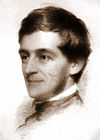Related Research Articles
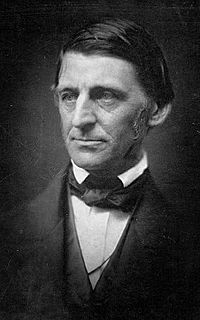
Ralph Waldo Emerson was an American essayist, lecturer, philosopher, and poet who led the transcendentalist movement of the mid-19th century. He was seen as a champion of individualism and a prescient critic of the countervailing pressures of society, and he disseminated his thoughts through dozens of published essays and more than 1,500 public lectures across the United States.
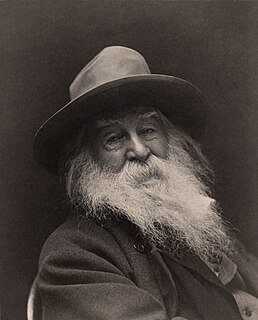
Walt Whitman was an American poet, essayist, and journalist. A humanist, he was a part of the transition between transcendentalism and realism, incorporating both views in his works. Whitman is among the most influential poets in the American canon, often called the father of free verse. His work was controversial in its time, particularly his poetry collection Leaves of Grass, which was described as obscene for its overt sensuality. Whitman's own life came under scrutiny for his presumed homosexuality.

Leaves of Grass is a poetry collection by the American poet Walt Whitman (1819–1892). Although the first edition was published in 1855, Whitman spent most of his professional life writing and re-writing Leaves of Grass, revising it multiple times until his death. This resulted in vastly different editions over four decades—the first, a small book of twelve poems and the last, a compilation of over 400.

"Song of Myself" is a poem by Walt Whitman (1819–1892) that is included in his work Leaves of Grass. It has been credited as "representing the core of Whitman's poetic vision."

James Russell Lowell was an American Romantic poet, critic, editor, and diplomat. He is associated with the Fireside Poets, a group of New England writers who were among the first American poets that rivaled the popularity of British poets. These writers usually used conventional forms and meters in their poetry, making them suitable for families entertaining at their fireside.

"Ode on a Grecian Urn" is a poem written by the English Romantic poet John Keats in May 1819 and published anonymously in Annals of the Fine Arts for 1819.

John Burroughs was an American naturalist and nature essayist, active in the U.S. conservation movement. The first of his essay collections was Wake-Robin in 1871.
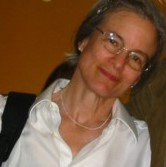
Sharon Olds is an American poet. Olds has been the recipient of the 2013 Pulitzer Prize in Poetry, the 1984 National Book Critics Circle Award, and the first San Francisco Poetry Center Award in 1980. She teaches creative writing at New York University.
Mary Jane Oliver was an American poet who won the National Book Award and the Pulitzer Prize. In 2007 The New York Times described her as "far and away, this country's best-selling poet."

The Conduct of Life is a collection of essays by Ralph Waldo Emerson published in 1860 and revised in 1876. In this volume, Emerson sets out to answer "the question of the times:" "How shall I live?" It is composed of nine essays, each preceded by a poem. These nine essays are largely based on lectures Emerson held throughout the country, including for a young, mercantile audience in the lyceums of the Midwestern boomtowns of the 1850s.

"When Lilacs Last in the Dooryard Bloom'd" is a long poem in the form of an elegy written by American poet Walt Whitman (1819–1892) in 1865.

The Epistles of Horace were published in two books, in 20 BCE and 14 BCE, respectively.

Sarah Helen Power Whitman was an American poet, essayist, transcendentalist, spiritualist and a romantic interest of Edgar Allan Poe.

Jones Very was an American poet, essayist, clergyman, and mystic associated with the American Transcendentalism movement. He was known as a scholar of William Shakespeare and many of his poems were Shakespearean sonnets. He was well-known and respected amongst the Transcendentalists, though he had a mental breakdown early in his career.
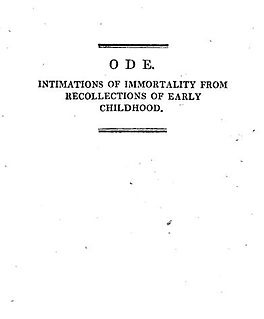
"Ode: Intimations of Immortality from Recollections of Early Childhood" is a poem by William Wordsworth, completed in 1804 and published in Poems, in Two Volumes (1807). The poem was completed in two parts, with the first four stanzas written among a series of poems composed in 1802 about childhood. The first part of the poem was completed on 27 March 1802 and a copy was provided to Wordsworth's friend and fellow poet, Samuel Taylor Coleridge, who responded with his own poem, "Dejection: An Ode", in April. The fourth stanza of the ode ends with a question, and Wordsworth was finally able to answer it with seven additional stanzas completed in early 1804. It was first printed as "Ode" in 1807, and it was not until 1815 that it was edited and reworked to the version that is currently known, "Ode: Intimations of Immortality".
- The poem is an irregular Pindaric ode in 11 stanzas that combines aspects of Coleridge's Conversation poems, the religious sentiments of the Bible and the works of Saint Augustine, and aspects of the elegiac and apocalyptic traditions. It is split into three movements: the first four stanzas discuss death, and the loss of youth and innocence; the second four stanzas describes how age causes man to lose sight of the divine, and the final three stanzas express hope that the memory of the divine allow us to sympathise with our fellow man. The poem relies on the concept of pre-existence, the idea that the soul existed before the body, to connect children with the ability to witness the divine within nature. As children mature, they become more worldly and lose this divine vision, and the ode reveals Wordsworth's understanding of psychological development that is also found in his poems The Prelude and Tintern Abbey. Wordsworth's praise of the child as the "best philosopher" was criticised by Coleridge and became the source of later critical discussion.

Howl and Other Poems is a collection of poetry by Allen Ginsberg published November 1, 1956. It contains Ginsberg's most famous poem, "Howl", which is considered to be one of the principal works of the Beat Generation as well as "A Supermarket in California", "Transcription of Organ Music", "Sunflower Sutra", "America", "In the Baggage Room at Greyhound", and some of his earlier works. For printing the collection, the publisher Lawrence Ferlinghetti, another well-known poet, was arrested and charged with obscenity. On October 3, 1957, Judge Clayton W. Horn found Ferlinghetti not guilty of the obscenity charge, and 5,000 more copies of the text were printed to meet the public demand, which had risen in response to the publicity surrounding the trial. "Howl and Other Poems" contains two of the most well-known poems from the Beat Generation, "Howl" and "A Supermarket in California", which have been reprinted in other collections, including the Norton Anthology of American Literature.

"Pioneers! O Pioneers!" is a poem by the American poet Walt Whitman. It was first published in Leaves of Grass in 1865. The poem was written as a tribute to Whitman's fervor for the great Westward expansion in the United States that led to things like the California Gold Rush and exploration of the far west.

The conversation poems are a group of at least eight poems composed by Samuel Taylor Coleridge (1772–1834) between 1795 and 1807. Each details a particular life experience which led to the poet's examination of nature and the role of poetry. They describe virtuous conduct and man's obligation to God, nature and society, and ask as if there is a place for simple appreciation of nature without having to actively dedicate one's life to altruism.
“One’s Self I Sing” is a poem by Walt Whitman, published in 1867 as the first poem for the final phase of Leaves of Grass. Although the general attitude towards the poem was not favorable, in July 1855 Whitman received the famous letter from Ralph Waldo Emerson in appreciation of his words of strength, freedom, and power, as well as, “meets the demand I am always making of what seemed the sterile and stingy Nature.”
Sjohnna McCray is an American poet. He is the author of Rapture, winner of the Walt Whitman award of the Academy of American Poets in 2015.
References
- 1 2 "The Poet" . Retrieved 14 Mar 2014.
- ↑ Miller, James E., Jr. Walt Whitman. New York: Twayne Publishers, Inc. 1962: 27.
